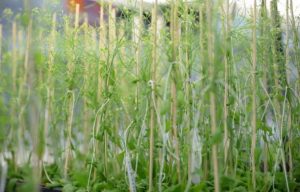
In this newly released article in The Plant Cell, researchers find that in Arabidopsis plants, the abortion of seeds with extra genomes is caused by the enzyme RNA Pol IV and the RNA-directed DNA methylation pathway, a major gene-silencing pathway in plants.
Seed Abortion and the Role of RNA Pol IV in Seed Development Abortion of seeds with extra genomes is caused by the enzyme RNA Pol IV ASPB is pleased to announce the publication in The Plant Cell of important research that explores the cause of seed abortion and the role of the enzyme RNA Pol IV to understand how seed development works.
In flowering plants, the embryo is surrounded by the endosperm. Endosperm tissue mediates nutrient transfer between the growing embryo and the mother. The endosperm is distinct from the rest of the plant because it has only one copy of the father’s genome and two copies of the mother’s. The ratio of maternal to paternal genomes is remarkable because of its importance to seed viability and development.
Seeds with extra genomes that alter this critical ratio undergo a process known as interploidy seed abortion due to defective endosperm development. RNA Pol IV is an enzyme specific to plant genomes that generates small RNA molecules that silence gene expression from transposons and repetitive DNA, playing a major role in defending the genome against viruses and transposable elements. The new work shows that RNA Pol IV plays a key role in interploidy seed abortion.
This research, coauthored by P.R.V. Satyaki and Mary Gehring of the Whitehead Institute for Biomedical Research, focused on the following questions: How does the lack of RNA Pol IV prevent interploidy seed abortion? Where does RNA Pol IV act, in the endosperm or in the father, to influence gene expression in the endosperm? In what genetic pathway does RNA Pol IV function to cause seed abortion?
In this article, Satyaki and Gehring demonstrate that RNA Pol IV targets genes in the father via the “canonical” RNA-directed DNA methylation pathway, a major gene-silencing pathway in Arabidopsis plants, resulting in interploidy seed abortion. The researchers compared gene transcription in the endosperm of aborted interploidy seeds with that of seeds that were viable due to the loss of paternal RNA Pol IV. The researchers found that transposons and thousands of genes, even imprinted ones, were misregulated in both living and dying seeds. The researchers learned that misregulation of a relatively small number of genes sets living seeds apart from aborting ones.
This study is also important because it identified a transcriptional buffering system in the endosperm. This system counteracts the effects of a higher dose of the paternal genome by reducing the expression of the paternal copies of some genes and increasing the expression of maternal copies of other genes.
First author P.R.V. Satyaki said: “The next steps are to unravel the mechanism underlying the transcriptional buffering system and to identify the genes responsible for interploidy seed abortion using the shortlist of candidate genes generated from our transcriptional studies.”
Author, and for more information:
Jennifer Regala
Managing Editor, The Plant Cell and Plant Physiology
ASPB
jregala@aspb.org
@JRegala_ASPB
Full citation: Satyaki, P.R.V., and Gering, M. (2019). Paternally-acting canonical RNA-directed DNA methylation pathway genes sensitize Arabidopsis endosperm to paternal genome dosage. Plant Cell doi: https://10.1105/tpc.19.00047. Image credit: Conor Gearin/Whitehead Institute. About the researchers: To arrange an interview with the authors please contact Mary Gehring mgehring@wi.mit.edu.
About The Plant Cell
The Plant Cell publishes novel research of special significance in plant biology, especially in the areas of cellular biology, molecular biology, genetics, development, and evolution. The Plant Cell, considered the top primary research journal in plant biology, was established in 1989 and celebrates its 30th anniversary this year.
About the American Society of Plant Biologists (ASPB)
ASPB is a professional scientific society, headquartered in Rockville, Maryland, devoted to the advancement of the plant sciences worldwide. With a membership of approximately 4,500 plant scientists from throughout the United States and more than 50 other nations, the Society publishes two of the most widely cited plant science journals: The Plant Cell and Plant Physiology. For more information about ASPB, please visit http://www.aspb.org/. Also follow ASPB on Facebook at facebook.com/myASPB and on Twitter @ASPB.
